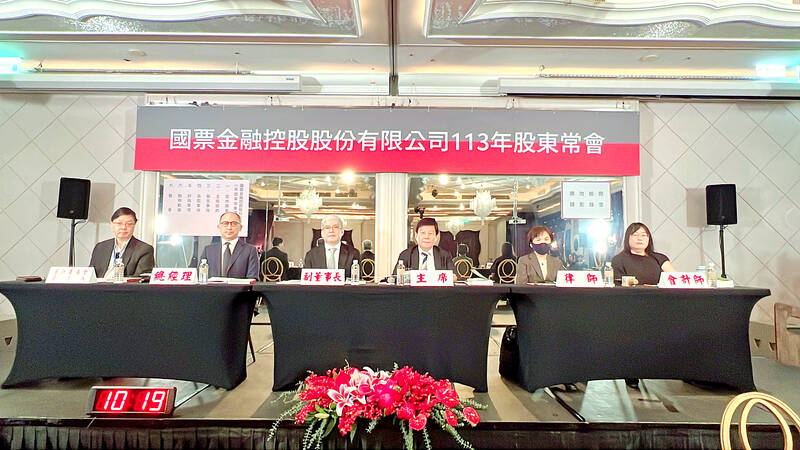IBF Financial Holdings Co (國票金控) yesterday said it is looking at better financial performance ahead, as its securities arm is riding on the TAIEX rallies and its bond holdings would benefit from interest rate cuts by the US Federal Reserve (Fed) later this year.
Its investment in Rakuten International Commercial Bank Co (樂天國際商銀) might also bear fruit faster than expected, after the government allowed online lenders to undertake corporate banking.
The conglomerate shared the views during an online investors’ conference, and its board later approved the distribution of NT$0.73 per share cash dividend on July 15 and a NT$0.246 stock dividend from last year’s net income of NT$2 billion (US$61.6 million), or earnings per share of NT$0.58. Last year’s results suggested a 55 percent spike from a year earlier.

Photo courtesy of IBF Financial Holdings Co
Profitability in the first five months of this year appeared lukewarm at NT$864 million, translating into an earnings per share of NT$0.25, or a tiny 0.28 percent growth from the same period last year, company data showed.
That is because the group’s bond business disappointed, although securities brokering and equities investment put up impressive showings, IBF president Michael Chen (陳冠舟) said.
Stagnant profitability had to do with the central bank’s unexpected interest rate hike in March, which narrowed the interest spread between Taiwan and the US market, Chen said, adding that bond holdings remained weighed by the Fed’s extended restrictive monetary policy.
The situation would brighten moving forward, as the Fed is widely believed to lower interest rates soon, thereby bolstering bond prices, Chen said.
The bond prices have inverse relationships with interest rates.
By contrast, the securities arm saw a 50 percent increase from a year earlier, in terms of commissions, transactions and margin financing, IBF said.
The TAIEX yesterday finished the first half of this year with a 28.4 percent increase to 23,032.25, gathering 5,100 points on the back of capital inflows from investors abroad and at home trying to capitalize on the artificial intelligence (AI) fever.
Taiwanese firms supply AI chips, servers, storage and memory devices.
The group’s bills business also reported a noticeable earnings increase from a year earlier, Chen said.
IBF said it would better leverage its investment in Rakuten Bank, which is to participate in commercial banking, following regulatory permissions.
With a longstanding focus on corporate banking, the conglomerate would lend support and experience to the online bank and speed up its schedule of breaking even, IBF officials said.
At the same time, IBF has set up a leasing subsidiary in hopes of expanding its services to more small and medium-sized enterprises in a more flexible fashion, officials said.
IBF shares ended up 2.22 percent to NT$16.1, higher than the TAIEX’s 0.55 percent rise, Taiwan Stock Exchange data showed.

Anna Bhobho, a 31-year-old housewife from rural Zimbabwe, was once a silent observer in her home, excluded from financial and family decisionmaking in the deeply patriarchal society. Today, she is a driver of change in her village, thanks to an electric tricycle she owns. In many parts of rural sub-Saharan Africa, women have long been excluded from mainstream economic activities such as operating public transportation. However, three-wheelers powered by green energy are reversing that trend, offering financial opportunities and a newfound sense of importance. “My husband now looks up to me to take care of a large chunk of expenses,

SECTOR LEADER: TSMC can increase capacity by as much as 20 percent or more in the advanced node part of the foundry market by 2030, an analyst said Taiwan Semiconductor Manufacturing Co (TSMC, 台積電) is expected to lead its peers in the advanced 2-nanometer process technology, despite competition from Samsung Electronics Co and Intel Corp, TrendForce Corp analyst Joanne Chiao (喬安) said. TSMC’s sophisticated products and its large production scale are expected to allow the company to continue dominating the global 2-nanometer process market this year, Chiao said. The world’s largest contract chipmaker is scheduled to begin mass production of chips made on the 2-nanometer process in its Hsinchu fab in the second half of this year. It would also hold a ceremony on Monday next week to

TECH CLUSTER: The US company’s new office is in the Shalun Smart Green Energy Science City, a new AI industry base and cybersecurity hub in southern Taiwan US chip designer Advanced Micro Devices Inc (AMD) yesterday launched an office in Tainan’s Gueiren District (歸仁), marking a significant milestone in the development of southern Taiwan’s artificial intelligence (AI) industry, the Tainan City Government said in a statement. AMD Taiwan general manager Vincent Chern (陳民皓) presided over the opening ceremony for the company’s new office at the Shalun Smart Green Energy Science City (沙崙智慧綠能科學城), a new AI industry base and cybersecurity hub in southern Taiwan. Facilities in the new office include an information processing center, and a research and development (R&D) center, the Tainan Economic Development Bureau said. The Ministry

ADVERSARIES: The new list includes 11 entities in China and one in Taiwan, which is a local branch of Chinese cloud computing firm Inspur Group The US added dozens of entities to a trade blacklist on Tuesday, the US Department of Commerce said, in part to disrupt Beijing’s artificial intelligence (AI) and advanced computing capabilities. The action affects 80 entities from countries including China, the United Arab Emirates and Iran, with the commerce department citing their “activities contrary to US national security and foreign policy.” Those added to the “entity list” are restricted from obtaining US items and technologies without government authorization. “We will not allow adversaries to exploit American technology to bolster their own militaries and threaten American lives,” US Secretary of Commerce Howard Lutnick said. The entities